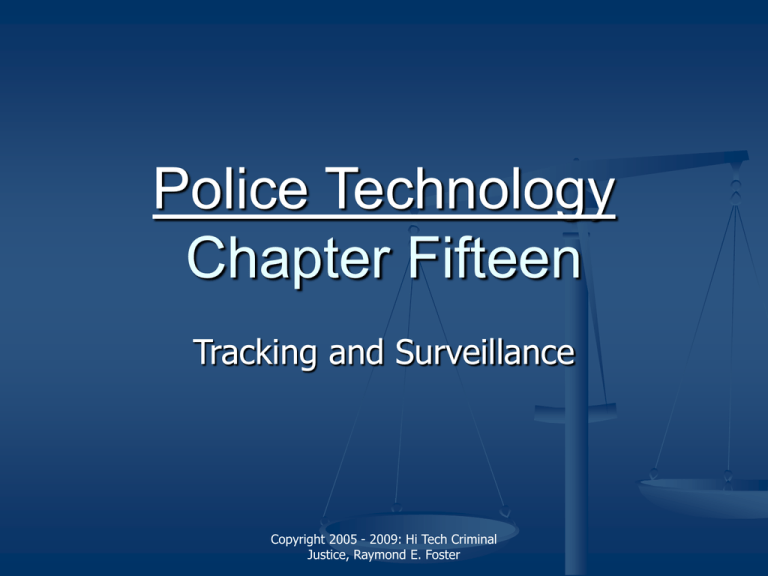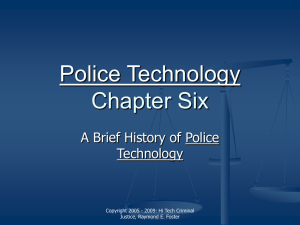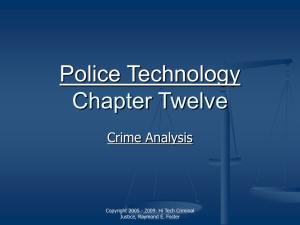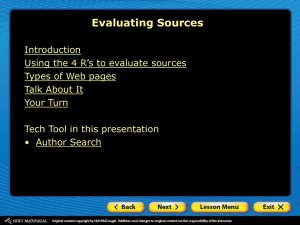Chapter Fifteen - Tracking Surveillance
advertisement

Police Technology Chapter Fifteen Tracking and Surveillance Copyright 2005 - 2009: Hi Tech Criminal Justice, Raymond E. Foster Learning Objectives Understand the difference between passive surveillance and interactive surveillance Explore techniques for tracking vehicles Explore using technology to hear or watch offenders Copyright 2005 - 2009: Hi Tech Criminal Justice, Raymond E. Foster Surveillance Defined As sustained observations of an offender, a group of offenders, or a location. Passive – just watching Interactive – interacting with the offender Copyright 2005 - 2009: Hi Tech Criminal Justice, Raymond E. Foster Fourth Amendment Issues Anything someone does in public is open to surveillance without court order. Anything that goes on that would be reasonably visible from the street is open to surveillance without a warrant (Plain Sight Doctrine) Copyright 2005 - 2009: Hi Tech Criminal Justice, Raymond E. Foster Tracking Vehicles Used in criminal investigations in three manners: When the police install a tracking device on an offender’s vehicle. When you have a tracking device on your personal vehicle and it is stolen. When the police follow a vehicle in person Copyright 2005 - 2009: Hi Tech Criminal Justice, Raymond E. Foster Consumer installed Automatic Vehicle Locator System is activated and reports to a central location. Vendor contacts police. Vendor supplies the location of the vehicle to the police. Copyright 2005 - 2009: Hi Tech Criminal Justice, Raymond E. Foster Two types of Consumer installed AVL: Locating technology is installed in a police vehicle. System is activated and police receive signal and search for the vehicle using technology installed in the police vehicle. Copyright 2005 - 2009: Hi Tech Criminal Justice, Raymond E. Foster Covert Tracking Photograph provided by SpektraTek Law Enforcement Technologies Installing a device ON the vehicle, usually on the undercarriage. Vehicle must be parked on a public street. Copyright 2005 - 2009: Hi Tech Criminal Justice, Raymond E. Foster Covert Tracking Installing a device IN the vehicle using requires a warrant because you are entering the vehicle Copyright 2005 - 2009: Hi Tech Criminal Justice, Raymond E. Foster Tracking Electronic Communications Screen Capture provided by Pen-Link™ Cellular transmissions can be tracked by having the cellular provider forward realtime information on the cell sites the device is using. Requires a court order. Copyright 2005 - 2009: Hi Tech Criminal Justice, Raymond E. Foster Photo Red Light Sensors, usually under the pavement, are coordinated with the traffic signal. Anyone entering the intersection after the red light is detected and photographed. Copyright 2005 - 2009: Hi Tech Criminal Justice, Raymond E. Foster Photo Red Light Photographic traffic enforcement systems (photo red light) use one of three types of film: Industrial quality 35mm film (most common) Digital cameras (digital images) Video cameras – allow for real-time transmission of images. Copyright 2005 - 2009: Hi Tech Criminal Justice, Raymond E. Foster Police In-car Video Video recording devices offer visual documentation of an event. Limitations: Must be operating 24/7, in all weather, in all conditions ruggedized Storage, record keeping, duration of tapes What to record, when, how long? Copyright 2005 - 2009: Hi Tech Criminal Justice, Raymond E. Foster Police In-car Video Videotapes are analog. DVD’s are digital. Digital Video Cassettes (DVCs) can contain more information than analog videotapes and are smaller, but you still have lots of small tapes. Storage? Records? Copyright 2005 - 2009: Hi Tech Criminal Justice, Raymond E. Foster Closed-Circuit Television CCTV is noncommercial video recordings that are broadcast on a private network (e.g., convenience stores). Top 3 uses of CCTV: Investigative Evidence documentation Crime reduction Copyright 2005 - 2009: Hi Tech Criminal Justice, Raymond E. Foster Closed-Circuit Television Top 3 uses of CCTV: Investigative Evidence documentation Crime reduction Photograph provided by SpektraTek Law Enforcement Technologies Copyright 2005 - 2009: Hi Tech Criminal Justice, Raymond E. Foster Uses of CCTV Photographic traffic enforcement In-car camera systems (police cars or bait cars) Surveillance of public places Covert surveillance operations Copyright 2005 - 2009: Hi Tech Criminal Justice, Raymond E. Foster Uses of CCTV Photograph provided by Pyramid Vision Technologies Some CCTV system are portable, while others are hardwired into vehicles and locations. The choice of type of system affects capabilities and is usually dictated by budget and mission Photograph provided by SpektraTek Law Enforcement Technologies Copyright 2005 - 2009: Hi Tech Criminal Justice, Raymond E. Foster Body Wires Audio devices that can be secreted on a person. Used during interactive surveillance especially undercover capacity. No warrant or court order is required. Consists of a transmitter, power source, and antenna. Copyright 2005 - 2009: Hi Tech Criminal Justice, Raymond E. Foster Night Vision Devices Night vision technology consists of two major types: Light amplification imaging (intensification) Thermal imaging (infrared) Copyright 2005 - 2009: Hi Tech Criminal Justice, Raymond E. Foster Light amplification Takes small amount of light from surrounding area Converts protons into electrons Directs electrons through disk channels Electrons bounce around and release more energy Copyright 2005 - 2009: Hi Tech Criminal Justice, Raymond E. Foster Thermal Imaging Photograph provided by ITT Industries Imagers take infrared light (heat) and focus it on light detectors Detectors create a thermogram (pattern) Imager converts info to electrical data and creates an image. Copyright 2005 - 2009: Hi Tech Criminal Justice, Raymond E. Foster Video Evidence There are other sources of video evidence besides CCTV at a crime location ATM machines Gas stations Post offices Parking Lots Copyright 2005 - 2009: Hi Tech Criminal Justice, Raymond E. Foster Police Technology Find Military Books at www.military-writers.com Copyright 2005 - 2009: Hi Tech Criminal Justice, Raymond E. Foster







